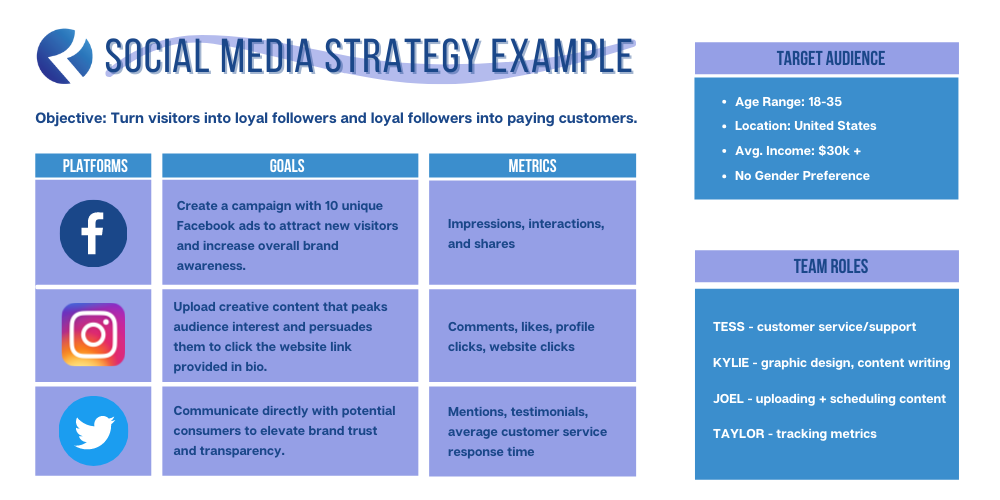
Social Media Tips for Small Businesses
Kristyn Miller
Table of Contents
In some ways, growing a business from the ground up is easier than ever before. That is, of course, if you know how to properly utilize the current digital marketing strategies and tools that are available to you.
One of the best ways to go about growing your business is by the use of social media. With billions of users across numerous different social media platforms, small business owners are able to take full advantage of the benefit of a worldwide audience at their fingertips.
However, it is one thing to simply make a social media account for your business, but it is an entirely different ballpark when it comes to implementing a successful and properly-executed social media strategy to really boost your business’s success.
In this post, our social media management experts at Kiopi will provide you with several useful social media tips for small businesses.
Social Media Marketing Tips
The problem many businesses face when it comes to social media isn’t whether they should take advantage of it, as the answer to that is increasingly obvious.
Rather, the problem is how they should take advantage of it. There seems to be an overload of information out there regarding tips and tricks for growing a business through the use of social media, so how does one filter through it all to find the methods that work best for them?

Below, we’ve compiled a list of tips that we believe are the most effective in growing your business with social media, no matter what industry you’re in.
- Identify Your Objective
- Curate a Plan (Our social media strategists recommend using a social post planner for this!)
- Find Your Target Audience
- Identify Your Competition
- Keep Up With Trends
- Build Consumer Relationships
- Create Engaging Content
- Advertise Your Goods and Services
- Implement the Right Tools
- Track Your Performance
How To Use Social Media for Small Business
It is safe to say that most of us use social media in our daily lives and are all relatively familiar with popular platforms such as Facebook, Instagram, and Twitter.
However, social media for personal usage varies significantly from how social media impacts a business. There is typically a shared end goal when implementing a social media business plan, as opposed to simply keeping your friends, family, and followers up to date with your personal life.
With this in mind, any strong business strategy begins with an overarching goal and a sound plan for how to get there. After all, you’re basically taking a shot in the dark if you don’t have a solid plan in place first, which means you’ll also have no way of knowing if your efforts are paying off. (Learn more about a social marketing planner.)
As a result, the first tip for using social media for your small business is to start with an objective. Make sure your goals are both attainable and able to be easily measured.
Examples of common social media objectives include:
- Building brand awareness
- Driving traffic to your website
- Increasing sales
- Generating new leads
- Growing your audience/follower base
- Improve customer support
- Increasing sign-ups for newsletters and/or emails
- Incorporating effective social selling techniques
Once you have a goal in mind, it’s time to put together an effective plan for achieving that goal. For more information on how to create an effective social media strategy, check out the tips and tricks we’ve provided on our blog.
After having a clear objective and strategy in place, it’s important that you identify your target audience.
Find out who your potential customers are, what they are looking for, and where they are looking for it. By doing so, you’ll be able to generate material that is more likely to reach and speak directly to them, all while increasing the chances that they engage with your brand.
How To Use Social Media to Grow Your Business

Now that you’ve identified the necessary elements to implement social media into your business plan, it’s time to identify your competition. What other businesses are similar to your own and may be taking away potential customers?
Further, what strategies do they employ when it comes to social media and marketing?
While you certainly don’t want to copy what they’ve done, learning from their successes or failures may be a good approach to shortening your own learning curve. By completing a competitive analysis, you can get a step ahead by figuring out what works and what doesn’t for small businesses similar to your own.
Another great way to help grow your business through social media is to keep up with the current trends, like Twitter trending now, for example. It’s a good idea to keep an eye on social media trends so that you know what people are expecting when they log in to their accounts.
This may be something like a trending hashtag on Twitter, trendy small business hashtags, or a certain format or feature (live streams, stories, etc.) that appears to be popular with your audience.
This aids in creating relevant material that may utilize a short-term fad but results in a long-term impact.
Once you find trending content, you can use engaging interactive posts on social media to encourage users to interact with your brand.
If you don’t have time to devote to this, you may want to outsource social media management.
Another important aspect of social media growth is the ability to build relationships with your audience. Communicating directly with consumers and followers is a unique and incredibly beneficial feature of social media marketing for small businesses.
Instead of pushing for an immediate sale, try to create more meaningful connections over time. For example, responding to people who engage with your organic content or ads can aid in forming trust and a devoted following.
How To Promote Your Business on Social Media

In order to successfully promote your growing business, start with creating unique and engaging content. If done correctly, this can help you rise in the platform’s algorithm as people share and like your material, essentially gaining free exposure.
Promoting specials and discounts, arranging follower giveaways, conducting surveys, and developing branded hashtags are just a few examples. Sharing user-generated material is another effective strategy. Encourage your customers to bring in photos or videos of them using your product or service for a chance to be featured on your platform. This can aid in the creation of one-of-a-kind deliverables while also enhancing customer interaction.
See our new social media contest ideas!
In addition to posting creative content, it can also be beneficial to create content specifically designed for social media advertising. This may be through paid social advertisements or by promoting organic content.
Paid advertising is exactly what it sounds like. It is a form of advertising on a social platform that requires payment to reach the intended audience. Paid social advertising may have a stronger call-to-action message and be part of a bigger overall campaign, depending on the content. (Check out our blog for more information about how to advertise on Facebook.)
A promoted post is similar in that you pay the platform to make your post visible to a larger audience. However, the concept behind promoted posts, as opposed to paid ads, is that you can increase the reach of a high-performing organic post or make an ad from it without having to develop a whole marketing campaign around it.
Regardless of the route you choose to take, paying to ensure your content reaches a wider audience can significantly benefit your business as a whole.
How To Manage Social Media for Small Business
Now that you know the best ways to utilize social media to grow and promote your small business, it’s important that you know how to properly manage it.
The key to managing social media is to implement the right tools that can help automate or simplify your work. There are several solutions available to assist you in increasing your productivity without hiring a full-time social media marketing team. Some essentials that will undoubtedly benefit you by keeping in your social media marketing toolkit include:
- Social media content calendar
- Social media scheduling tool
- Link shortener tool
- Campaign management tool
- Social media analytics tool
In addition to utilizing these tools (all of which are available for FREE with a Kiopi plan), it is also important that you keep track of your progress across all social media platforms. It’s unrealistic to expect every social media strategy or campaign to succeed the first time around.
Learn more about the elements of a social media campaign.
You may find that certain techniques don’t work as well as you expected while others perform even better. This is why tracking the performance of your social media marketing efforts is critical in measuring your success.
The easiest approach to figure out what is working for you and what isn’t is to use one of the aforementioned tools: an analytics tool. Understanding your analytics based on consumer reaction (or lack thereof) will help you in improving your approach the next time you implement a social media strategy.
Social Media Management for Small Businesses
One of the best things about social media for small businesses is that you may utilize any number of social media tools for business in whatever way makes sense for your company and your budget at any given time.
Once you find what works for you, you may begin increasing your efforts and hopefully expanding your audience.
You’re already on the right track if you’re taking advantage of social media to help grow your small business. Remember, though, that social media for your business involves far more than simply having an account. In the fast-paced, ever-changing world of social media, it’s vital that you stay on top of social trends and have a thorough grasp of social media management skills and useful tools that can help simplify your routine.
By incorporating a social media management application like Kiopi into your marketing plan, you’re on the road to turning your small business into a BIG one.

